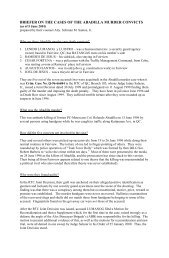Republic of the Philippines - Campaign
Republic of the Philippines - Campaign
Republic of the Philippines - Campaign
Create successful ePaper yourself
Turn your PDF publications into a flip-book with our unique Google optimized e-Paper software.
APPELLANTS’ BRIEF<br />
People <strong>of</strong> <strong>the</strong> <strong>Philippines</strong> vs. Fortuna, et. al.<br />
S. C. G. R. No. 141660-64<br />
Testifying in open court that <strong>the</strong>re were two persons who each pointed a gun at him<br />
materially contradicts his earlier statement that only one <strong>of</strong> <strong>the</strong> four suspects pointed a<br />
gun at him.<br />
Making <strong>the</strong> court believe that he was not nervous and that <strong>the</strong> o<strong>the</strong>r suspects all<br />
faced him when one <strong>of</strong> <strong>the</strong> suspects pointed a gun and shouted at him when in his<br />
affidavit he related that he was nervous and could not move, is a material contradiction<br />
that goes directly into <strong>the</strong> possibility <strong>of</strong> correctly identifying <strong>the</strong> suspects.<br />
His declaration in his affidavit that he was nervous and could not move is but a<br />
natural reaction to a startling and threatening situation. His testimony in open court,<br />
however, suggests that <strong>the</strong> witness was coached in an attempt to bolster his credibility<br />
and ability to identify <strong>the</strong> suspects despite <strong>the</strong> threat to his own life at that moment.<br />
These discrepancies taken toge<strong>the</strong>r all point out that <strong>the</strong> lone eyewitness presented<br />
in open court has added material details in his testimony in open court. These additions<br />
which directly and significantly contradicted his sworn statement gravely affected his<br />
credibility as a witness.<br />
As this honorable court ruled in People vs. Mandao:<br />
“As a rule, testimonial evidence or oral testimony<br />
commands greater respect than a mere affidavit. Hence,<br />
discrepancies between <strong>the</strong> two do not necessarily discredit a<br />
witness. However, this principle finds no application in a case in<br />
which <strong>the</strong> latter directly and significantly contradicts material<br />
matters made in <strong>the</strong> former. Accordingly, when <strong>the</strong>re is an<br />
omission in an affidavit concerning a very important detail that<br />
may well determine <strong>the</strong> culpability <strong>of</strong> <strong>the</strong> accused, that omission<br />
can affect <strong>the</strong> affiant’s credibility.” (G.R. No. 135048, December<br />
3, 2002, citing People v. Doinog, 332 SCRA 336, May 31,<br />
2000).<br />
C. The witness’ recollection <strong>of</strong> <strong>the</strong> appearance <strong>of</strong> <strong>the</strong> assailants is highly<br />
unreliable and raises serious doubts as to whe<strong>the</strong>r <strong>the</strong> suspects he saw are <strong>the</strong><br />
same persons as <strong>the</strong> accused or as to whe<strong>the</strong>r <strong>the</strong> witness has made a positive<br />
identification at all.<br />
Page 38 <strong>of</strong> 127<br />
38




